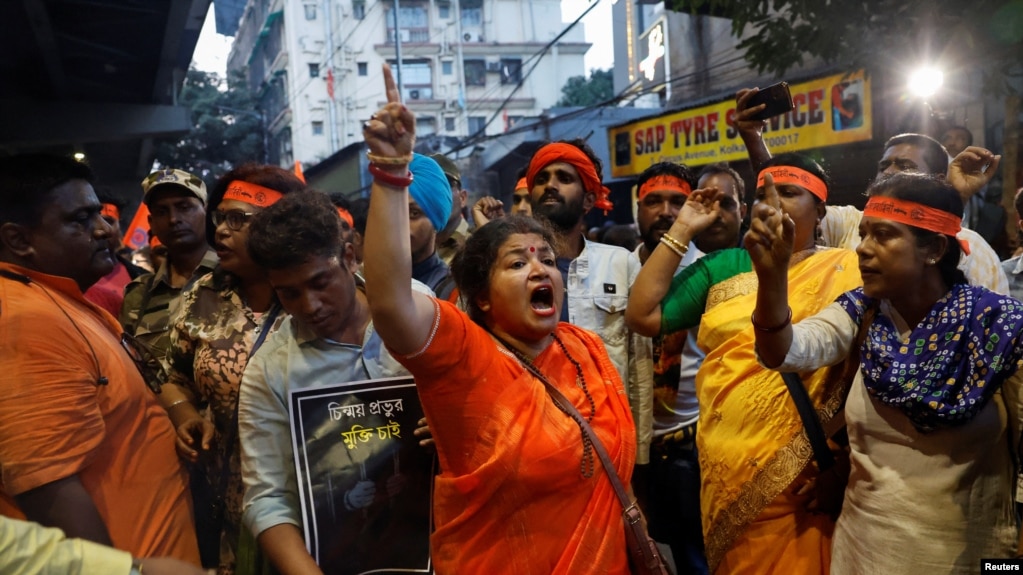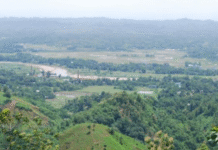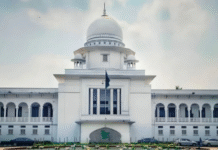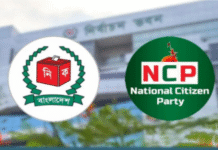
Tensions between India and Bangladesh have risen to alarming levels following the recent arrest of a Hindu monk in Dhaka and allegations that Hindus are being persecuted in the Muslim-majority nation.
Hindu groups in India have staged anti-Bangladesh protests in recent weeks, but Bangladesh officials have said the accusations of persecution are unfounded. They said Indian news media and social media users are spreading misinformation and fueling friction.
Diplomatic relations between the two countries have soured since August, when a student-led uprising ousted authoritarian prime minister Sheikh Hasina. She fled to India and took refuge in the country.
Arrest of Chinmoy Krishna Das
Then on November 25, a Bangladeshi Hindu monk, Chinmoy Krishna Das, was arrested at the Dhaka airport on charges of sedition. He was accused of raising a saffron Hindu flag on top of a Bangladeshi national flag during an October rally in the coastal city of Chittagong.
Das has been an advocate for religious minorities in the country. Until July, he been a member of the International Society of Krishna Consciousness or, ISKCON, also known as the Hare Krishna movement. He was expelled from ISKON after being accused of abusing children.
Das’s sedition arrest sparked protests by his supporters, and a Muslim attorney was killed outside the Chittagong courthouse.
Anger in India
In neighboring India, protesters called for the release of Das, who remains in custody. His next bail hearing is scheduled to take place on January 2.
Hindu groups have launched rallies and urged Prime Minister Narendra Modi to pressure Dhaka to release Das and to take action to stop attacks on Hindus in Bangladesh.
On Wednesday, V Bhagaiah, national committee member of Rashtriya Swayamsevak Sangh, the ideological mentor of India’s ruling Hindu nationalist Bharatiya Janata Party, said that Hindus have become victims of “genocide” in Bangladesh.
“While minority Hindus are being murdered and raped, and Hindu temples and properties are being destroyed, the (Muhammad Yunus-led) interim government is quietly watching the genocide,” Bhagaiah said at a rally in Hyderabad.
Former Indian Army officer Major General Gagandeep Bakshi, who often appears on national TV channels in India as a security analyst, said that to end the persecution of Hindus in Bangladesh, “the only solution” is to carve out a “Hindu Nation” from within the Muslim-majority Bangladesh.
“Bangladesh under Mohd Yunis [Mohammad Yunus] has turned to radical jihadism. It wants to push out its Hindu minorities via genocide and seems itching for a fight,” he said on X.
“Divide Bangladesh in two parts. Make a separate country for Bangladeshi Hindus.”
On Dec. 2, angry Hindu protesters ransacked the office of a deputy high commissioner of Bangladesh in the northeast Indian border state of Tripura.
Response from Bangladesh
Hindu temples and properties occasionally have been attacked in Bangladesh over the past years, allegedly by Islamist elements.
The Yunus government agrees that Hindus faced violent attacks after Hasina’s ouster. But the violence was motivated by politics, not religion, officials said.
The charge that the Hindu community is being violently targeted in Bangladesh, is “completely baseless,” said Hasib Aziz, commissioner of Chittagong Metropolitan Police.
“Not even a fraction of the allegations surfacing in Indian media that Hindus are facing persecution in Bangladesh is true. The allegation that Chinmoy Das was arrested because he is Hindu is baseless. He was charged under sedition and has been arrested as per law, for inciting violence and indulging in certain subversive activities,” Aziz told VOA.
“Nobody is being targeted in any orchestrated, anti-Hindu hate attack.”
Former prime minister Sheikh Hasina and others in India have launched a concerted misinformation campaign claiming that Hindus are “facing a genocide” in Bangladesh, Bangladeshi former diplomat Khalilur Rahman told VOA.
“All they want is to destabilize Bangladesh,” said Khalilur Rahman, senior representative of the Chief Adviser Muhammad Yunus, who leads Bangladesh.
He said the interim government in Bangladesh has emphasized the importance of improving the relationship between the two countries, based on mutual respect.
“Our foreign secretary met his Indian counterpart in Dhaka today. We hope to see efforts to carry forward our bilateral relations in a positive direction. It is in the best interest of both countries and the region,” Khalilur Rahman said on Monday.
Meghmallar Basu, who is the president of Students’ Union, a left-leaning student organization at Dhaka University, said that to call the tensions and violence in Bangladesh “genocide against Hindus” would be a “shameless lie.”
Basu, a Hindu, acknowledged the attacks on some Hindu temples and houses by certain “anti-social forces” who took advantage of the collapse of the Hasina government.
“The misinformation that Hindutva activists in India are intentionally spreading on social media is worsening the relations between the two countries,’’ Basu said. ‘’The Hindu-Muslim relations in our country are also at the risk of worsening because of this propaganda.”
Allegations of ‘fake news’
Many blamed India’s mainstream and social media for spreading “fake news” and stoking the tension between the two countries.
Sajjad Hossain Chowdhury, head of operations at the fact-checking organization Rumor Scanner, told VOA that the Indian media and Hindutva nationalist ‘X’ and Facebook accounts have been spreading “fake news” about Bangladesh since the fall of Awami League government.
“Several Indian mainstream media outlets showed a video of the ritual of immersion of goddess Kali in India and claimed that it was the scene from a temple being vandalized by Islamists in Bangladesh. Using a video clip of a Hindu religious program in India — in which some women were trampled to death— many Indian Hindutva supporters wrote on X that they were Hindu women who had been raped and murdered by Islamists in Bangladesh,” Chowdhury said.
“We have identified more than a dozen rumors spread about Bangladesh, by at least 49 Indian media outlets, between Aug. 12 and Dec. 5.”
Dhaka-based political analyst Zahed Ur Rahman said that the narrative that Hindus in Bangladesh are under persecution is consistent with the “identity politics” of the current ruling party in India.
“So, the Indian authorities constantly try to label certain politically motivated attacks on some Hindus in Bangladesh as communal violence. And despite all the development the Indian media has undergone, it has morphed into a political propaganda mouthpiece of the BJP since they came into power in 2014,” he said.
Zahed Ur Rahman added: “The media ultimately feeds on the radical mindset that a significant number of Indians now possess. This is a result of living in an extremist political environment for too long.”
Jon Danilowicz, a retired U.S. diplomat who has served in Bangladesh, said that it is difficult to fathom how the recent “war of words” between India and Bangladesh serves either country’s interest.
“After mistakenly backing former PM Hasina past her expiration date, India appears to be stubbornly doubling down on its failed Bangladesh policy. The charges that Nobel Laureate Muhammad Yunus is leading an Islamist regime and unleashing genocide against the Hindu minority are ridiculously untrue,” he told the VOA.
Danilowicz said that while the Indian right wing may see verbal and rhetorical attacks on post-Hasina Bangladesh as a “smart domestic political strategy,” it does not serve India’s long-term regional interests.









